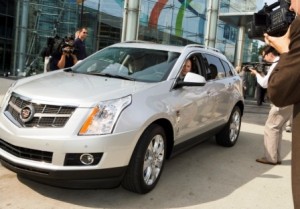The ongoing after effects of Toyota’s cover-up and delay in recalling millions of vehicles for unintended acceleration continue to have broader industry-wide implications.
In the latest instance, the National Highway Traffic Safety Administration overruled General Motors and insisted that 2010 Cadillac SRX models be recalled because the computer controlling the boost of the turbocharged engine increased the force-feeding of the cylinders if regular fuel is used instead of the required premium fuel.
A new, 2.8-liter turbocharged V6 is optional in the crossover SUV, which is modeled after the Lexus LS 350. (See Sneak Peak: 2010 Cadillac SRX ) The potential result of mis-fueling was connecting rod or piston failure with a chance for sudden engine stoppage as the engine pinged itself to destruction.
The computer program was responding to retarded engine ignition timing, which itself was the result of yet another part of the computer program reacting when at least six operators used the wrong fuel. Four of the Cadillacs were GM owned, one was dealer driven and one was customer owned, according to NHTSA records.
This is another in a growing list of problems caused by faulty or inadequate electronic controls, which are now almost universally used by automakers. Critics maintain that there is incomplete testing during the development of electronics in automobiles.
NHTSA has retained both NASA and the National Academy of Science to study electronic engine controls since it has little or no electronics expertise in house. NHTSA currently has 125 engineers working on auto safety, but only five are electrical engineers, and one other is a software engineer– that is right, one. (See NHTSA Has Five Electrical, One Software Engineer! )
GM argued, unsuccessfully, with NHTSA that this was in essence operator error and contrary to the owner’s manual – the biggest unread best seller in publishing history – and that no accidents were reported. GM had discussions for months with the federal agency during the same time it was undergoing withering criticism by the U.S. Congress, as well as safety advocates for its failure to act in the Toyota unintended acceleration mater, which potentially now involves 89 deaths. (See NHTSA Ups Toyota Death Tally)
Cadillac dealers will reprogram the engine control module free of charge – as required by law. The safety recall is expected to begin on or before June 11, 2010. Owners may contact the Cadillac Customer Assistance Center at 1-866-982-2339 or at the Owner Center at www.gmownercenter.com.
Owners may also contact the National Highway Traffic Safety Administration’s Vehicle Safety Hotline at 1-888-327-4236 (TTY 1-800-424-9153), or go to http://www.safercar.gov.

